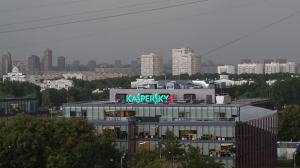Kaspersky Lab files for injunction in U.S. court, seeking to counter Trump administration ban

Moscow-based anti-virus company Kaspersky Lab has filed a motion for a preliminary injunction in U.S. federal court in hopes of halting the Trump administration’s ongoing efforts to ban Kaspersky software from use in federal agencies.
The move comes after Kaspersky Lab founder and CEO Eugene Kaspersky announced plans in December to sue the Department of Homeland Security (DHS), who originally launched the ban through a Binding Operational Directive (BOD) on Sept. 13 citing alleged espionage concerns. The motion was filed in the U.S. District Court for the District of Columbia late last night.
The Washington Post, New York Times and Wall Street Journal have all reported in recent months, citing anonymous U.S. intelligence officials, that Russian intelligence agencies have in the past leveraged Kaspersky Lab’s anti-virus engine to remotely steal confidential documents from targeted computers where the software is already installed.
Kaspersky Lab has repeatedly and unequivocally denied all wrongdoing. The company continues to question the U.S. government’s reasoning for the ban, as well as the evidence necessary to support such action.
In a statement sent to CyberScoop, Kaspersky Lab confirmed the filing and stated: “The company has made this filing in hopes that the court will address and resolve the appeal expeditiously in light of the BOD’s damage to the company. The company asserts that the DHS decision is unconstitutional and relied on subjective, non-technical public sources, such as uncorroborated and often anonymously sourced media reports, related claims, and rumors. Furthermore, DHS has failed to provide the company adequate due process to rebut the unsubstantiated allegations underlying the BOD and has not provided any evidence of wrongdoing by the company.”
The injunction is specifically focused on the rollout of DHS’s BOD. It does not appear designed to rebuff Congress’ own policy efforts to push Kaspersky Lab out of government systems, however. In December, President Donald Trump signed the annual National Defense Authorization Act (NDAA) into law, which itself contains additional language that further reenforces the ban against the Russian company.
It’s not clear if Kaspersky Lab’s motion for a preliminary injunction would be capable of also negating the affects of the NDAA. But the injunction provides the option for a near immediate day in court.
“A request for injunctive relief is unlikely to succeed on the legal merits,” said Edward McAndrew, a former federal cybercrime prosecutor in the U.S. Attorney’s Offices for the Eastern District of Virginia, via email. “Seeking injunctive relief, however, will provide Kaspersky with a public judicial forum in which to air its dispute with the government’s action – and perhaps to attempt to repair its reputation. If the court elects to hold a preliminary injunctive hearing, Kaspersky may be able to quickly get into a courtroom where it can present witness testimony and other evidence to dispute its debarment – and require the government to present public proof of the valid basis for its decision.”
McAndrew said it’s possible that the purpose of the injunction is to compel the publication of classified evidence.
The Justice Department declined to comment.
The injunction is the latest chapter in an ongoing saga that began at least as early as 2017 when lawmakers began to publicly voice concerns that Kaspersky Lab’s software posed a national security threat. Experts say the injunction may speed up the debate surrounding the ban, allowing for the company to stand up against the government in court and seek some relief. If successful the injunction would effectively halt DHS’ BOD until the conclusion of the full, final lawsuit between the two parties. But legal experts say the company faces considerable legal hurdles to do so.
“To obtain injunctive relief, Kaspersky bears the burden of proving: (1) a substantial likelihood of success for preliminary injunctive relief (and actual success for permanent injunctive relief); (2) that it will suffer irreparable harm if the injunction is not granted; (3) that the equities balance in favor of issuing the injunction; and (4) that the issuing the injunction is in the public interest,” said McAndrew, who now works as a counselor, investigator and trial lawyer for D.C. law firm Ballard Spahr LLP.
“The government will likely argue that Kaspersky’s challenge to the agency actions is now mooted by the codification of the Kaspersky ban in the 2018 National Defense Authorization Act,” McAndrew said.
The law firm representing Kaspersky Lab — Baker & McKenzie LLP — did not respond to a request for comment.



